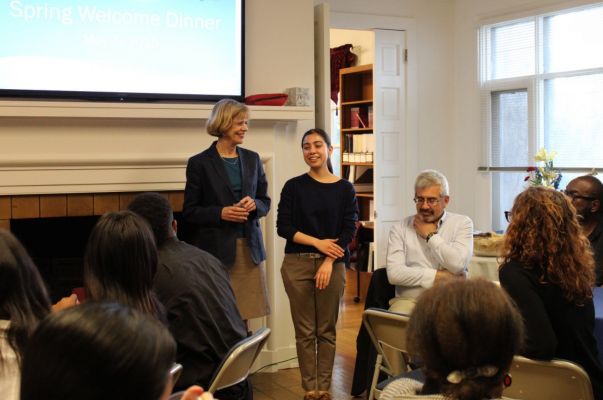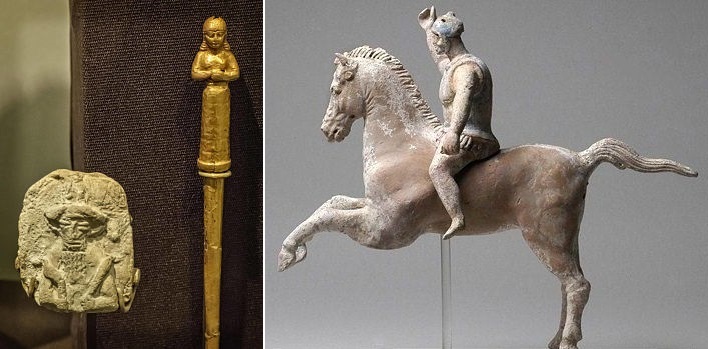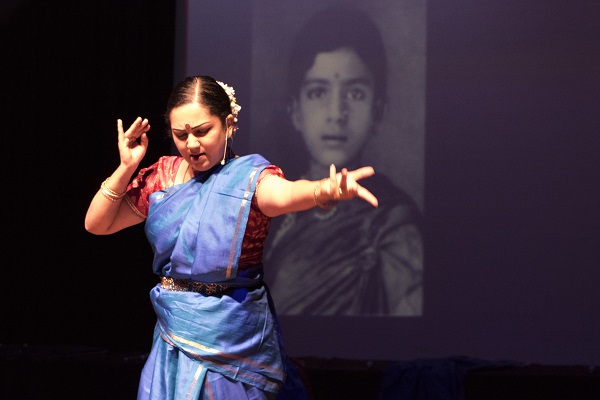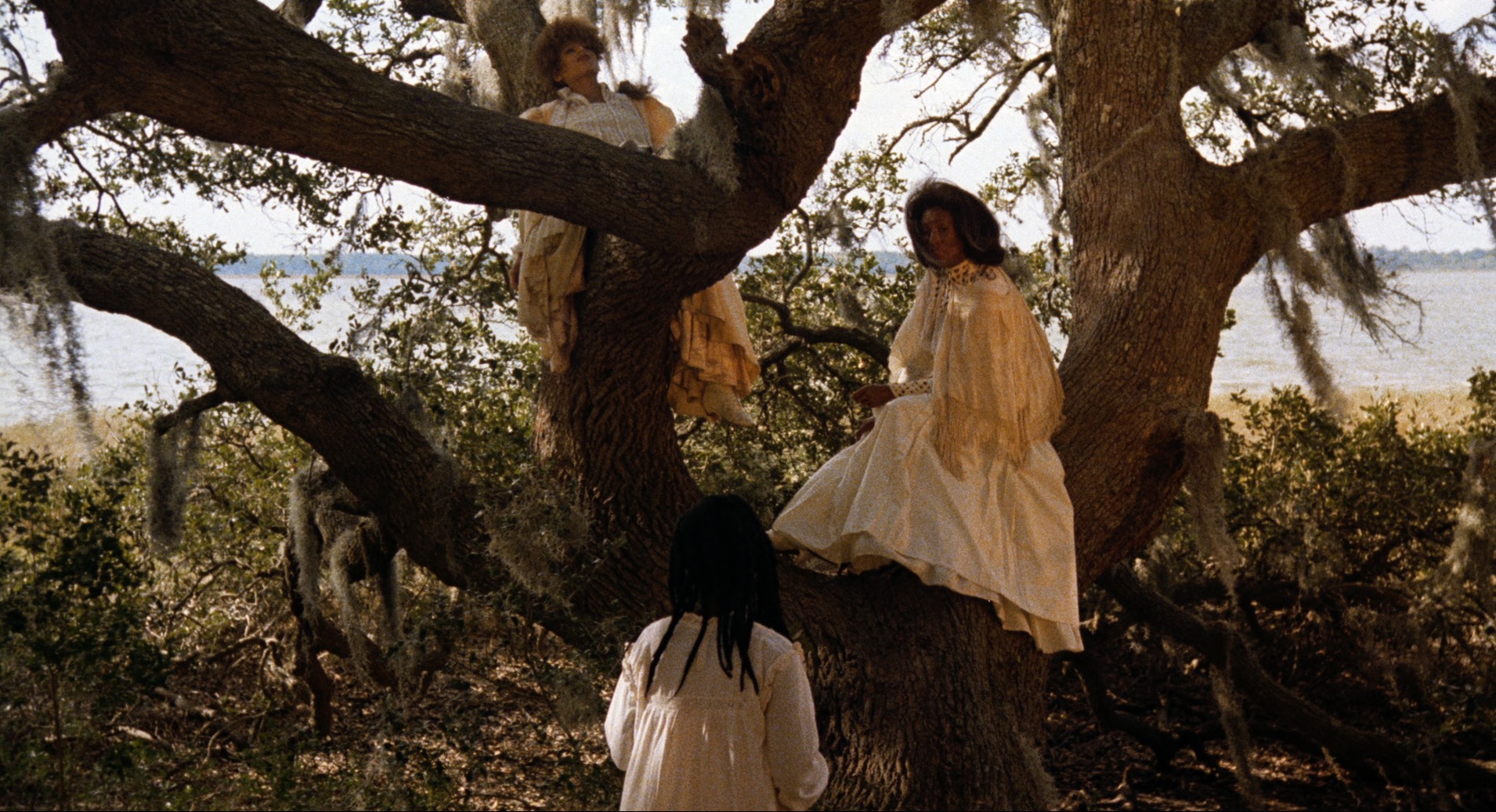Latest News
UCR’s First Student Cohort of MMUF to Graduate
In a few short weeks, the University of California, Riverside will graduate its first cohort of students awarded the Mellon Mays Undergraduate Fellowship (MMUF). UC Riverside was awarded a $500,000 grant in 2014 by The Andrew W. Mellon Foundation to support the MMUF program on campus. The purpose of MMUF is to help diversify college and university faculty by mentoring and preparing undergraduate students for graduate school and academic positions.
“UCR’s participation in the MMUF program is a testament to the strength of our student body as a whole,” said Georgia Warnke, program coordinator for MMUF at UCR, and the director of Center for Ideas and Society. “We are especially proud of our graduating fellows, however. As individuals, they are extraordinarily accomplished; as our first cohort they have collectively established a legacy of great success for the fellows who follow them.”
The three students graduating this year are Jazmine Exford, Maria Liliana Ramirez, and Cynthia Romero. A fourth student, Ariana Elizalde, may finish her undergraduate work over the summer and will then take a gap year before applying to graduate school.
Source: UC Riverside’s First Student Cohort of Mellon Mays Undergraduate Fellowship to Graduate
When Anthropologists Act as Artifacts #MMTW – Allegra
This post is the third installment of our thread on the Moving Matters Traveling Workshop (MMTW), a project that explores migration and mobility by developing artwork, exhibitions, performances and public interventions. In the first installment, anthropologist and writer Helen Faller talked to Susan Ossman, Artistic Director of MMTW and in part two, performance artist Priya Srinivasan reflected on movement.
The Hairpin (AB): Do you think that only legs can take you this far? And only four of them for that matter? Look at me, I have none, but I’ve been carried around by two-legged people and I crossed so many borders, and sometimes borders crossed me. If you stay long enough in one place, the borders will surely change. Nobody remembers this and acts as if they are eternal. Sometimes humans build enormous walls to mark the borders too, and make them real. Tell me, how did you get to this museum, to Amsterdam?The Golden Horse (OS): ‘Why’ is not a question to ask. Sometimes life seems like a chain of events you have no control over. There are decisions made elsewhere and you can be stuck in one place or rushed to another, and when asked afterwards if you had a plan, not to look a fool you just make up an answer.
My four legs may come handy when one needs to gallop. But that was never my story. I was born in the mind of a goldsmith and wrought in the flames of his workshop in Alexandria. I was made to accompany my master to his grave. But these origins did not define my destiny. Like you, I crossed several borders, but the first one to traverse was between life and death. From what I see you must know a thing or two about death. What’s that tarnish that spoils your shine? Gold does not rust…
The Hairpin (AB): Blood does. And I have seen more than my share. I have been used as deadly weapon more than once. A disenchanted princess slipped me from her silky hair, straight across the throat of her unsuspecting brother. She then had free reign to expand the territory of the kingdom and rename cities in her family’s honor. Humans love drawing lines with blood. I could tell you so many more stories about how I was caught up in battles about border lines before I was judged so precious that I had to give up an active life and become a part of this collection.
Source: When Anthropologists Act as Artifacts #MMTW – Allegra
Some Thoughts on Movement and the #MMTW – Allegra
It was the moment that the sociologist from University of Amsterdam Olga Sezneva announced “I will be a talking artifact” while striking a pose in the Allard Pierson Museum in Amsterdam that I knew our collaboration would work and that I was in the right place. The whole group burst into laughter and we continued our work of live performance in the museum engaging with the objects in the museum and also inserting our own objects into the exhibits. I had recently joined the Moving Matters group and was excited to bring my movement practices to the group at Susan Ossman’s invitation. Although Susan had invited me to join the group in 2013 after reading my book Sweating Saris: Indian Dance as Transnational Labor, I could not do so because I was actually “serially migrating” from California to Shanghai and then to Rotterdam. But in 2014 I joined the Motley Crue group of visual artists, scholars, writers, and performers from different parts of the world in Amsterdam at the Allard Peirson Museum of Mediterranean Antiquities.
“Daughters of the Dust” Kicks Off Free Film Series
The award-winning film “Daughters of the Dust” will kick off a free summer film series at the University of California, Riverside May 12-13.The series, “Film for Thought,” is part of the Center for Ideas and Society’s Mellon Advancing Intercultural Studies project. This two-year project will investigate issues surrounding economic inequality, access to higher education, religious identity and intolerance, and omitted or erased histories.
As the debut film in the series, “Daughters of the Dust” is co-sponsored by the UCR Speculative Fiction and Cultures of Science program. The screening will be hosted at the Culver Center of the Arts, 3824 Main St., on Friday, May 12, at 7 p.m. and Saturday, May 13, at 3 p.m. A panel discussion will follow the May 12 screening and will include: Jayna Brown, UCR associate professor of ethnic studies; Paulette Brown-Hinds, editor-in-chief of IE Voice; and moderator Derek Burrill, associate professor of media and cultural studies.
Source: UCR TODAY – “Daughters of the Dust” Kicks Off Free Film Series
Three Scholars Win Fulbright Grants
Three Scholars, all associated with the Center for Ideas & Society, win Fulbright Grants.
April 24, 2017: Fellowships will support research on women in French architecture, conservation-resource rights tensions in South Africa, and the state of religiosity in India.Heidi Brevik-Zender will hold the 2017-18 visiting professorship at the University of Aberdeen, Scotland, where she will do research for a book project exposing the role of women in 19th century French architecture.
Anthropologist Derick Fay will return to South Africa, where he has conducted extensive field studies since 1998, to investigate the relationships between conservation, law, and resource rights represented in the 2012 trial of three fishermen arrested in Dwesa-Cwebe Nature Reserve.
Political scientist Ajay Verghese will spend a year in India to determine if increasing socioeconomic development is causing a decline in religious belief but an increase in religious practice, a form of secularization that is distinct from the Western world.
THE MOVING MATTERS TRAVELING WORKSHOP
AN INTERVIEW WITH SUSAN OSSMAN #MMTW
Excerpt from an interview with Susan Ossman, Artistic Director of the Moving Matters Traveling Workshop, by Allegra Laboratory:
Helen: What is the Moving Matters Traveling Workshop?
Susan: The MMTW is a collective of artists and scholars who develop art together based on their shared experience of living in several countries. The project started in 2013 at a seminar where anthropologists and artists developed “creative responses” to my book Moving Matters, Paths of Serial Migration. Since then we have met in changing locations to address topics related to migration and mobility from our perspectives as “serial migrants” in art, exhibitions and performances. The MMTW grows through a process of progressive “inhabitations.” Just like a serial migrant, it settles into one country after another. We have traveled to California, France, the Netherlands and Romania. Berlin is coming up in June.
Heidi Brevik-Zender receives Fulbright US Scholar Award
Heidi Brevik-Zender (Associate Professor of French and Comparative Literature) has been selected for a 2017-18 Fulbright US Scholar Award. She will hold the Fulbright-Scotland Visiting Professorship at University of Aberdeen, where she will be working on a book-length research project on women, architecture, and the built environment in France in the 19th century.
Learn more about Professor Brevik-Zender and her work at complitforlang.ucr.edu.
The Critical Studies Collective
The Critical Studies Collective, a UC faculty and graduate student research initiative, received a substantial UCOP award to collaborate across five UCs to develop curricula, symposia, and a website, all devoted to Critical Refugee Studies. UCR’s Lan Duong (Media and Cultural Studies), founding member and co-organizer of the collective, hosted theTowards a Critical Refugee Studies Symposium with support from the Center for Ideas and Society in 2016. Members of the collective are also currently organizing an anthology of key papers.
Ajay Verghese receives Fulbright-Nehru Award
Ajay Verghese, an Assistant Professor of Political Science and current Fellow at the Center for Ideas and Society at UC Riverside, has received a Fulbright-Nehru Academic and Professional Excellence Award to fund nine months of research in India. Dr. Verghese will be studying how globalization and modernization are impacting religious communities and identity in contemporary India.
Learn more about Professor Verghese and his work at politicalscience.ucr.edu.
2nd annual Digital Humanities Infrastructure Symposium
Plan to attend the second annual Digital Humanities Infrastructure Symposium, February 23-24! The digital humanities represent the cutting edge of humanities research and instruction, but they also represent a fundamental shift in the paradigm of humanities, from the model of the lone scholar to that of the interconnected team; and from the model of the durable paper publication to that of the digital, ephemeral product. Since the infrastructure (including staff, resources, and services) necessary to support these new models are very different from those required by the old models, academic partners are being challenged to evolve rapidly to support those scholars, in ways that are efficient and sustainable.
Anthea Kraut will receive the Emory Elliott Book Award
UCR Today article by Mojgan Sherkat on this year’s Emory Elliott Book Award winner, Professor Anthea Kraut
“It is truly an honor to be recognized in this way by my own colleagues at UCR,” Kraut said. “I’m also very fortunate in that I got to benefit from Emory’s mentorship while he was still with us, and I’m so moved to play a role in carrying on his formidable legacy.”
About the book“Choreographing Copyright” is a new historical and cultural analysis of U.S. dance-makers’ investment in intellectual property rights. The book reconstructs efforts to win copyright protection for choreography and shows how dancers have embraced intellectual property rights as a means to both consolidate and contest racial and gender power.
Drawing on legal studies, critical race studies, gender studies, American dance history, and cultural studies of copyright, and through a series of case studies, Kraut offers fresh insight into the power dynamics of authorship and ownership in dance in the United States from the late 19th century to the early 21st century.
CHASS College Award Recipients
“Dr. Rudolph is an art historian whose research focuses on the art of Medieval Europe, with special attention to the role of visual expression in the articulation of intellectual and theological concepts, and their dissemination into the broader culture. As a medievalist, Rudolph’s work is lauded not only for its historical rigor, but also for its conceptual daring and theoretical sophistication. Rudolph is known to be a scholar who fearlessly asks the big questions. He also possesses the rare gift of being able to make complex and historically distant imagery clear and compelling to a twenty-first century audiences.”
The 26th Annual NAACP Theatre Awards
UCR’s Rickerby Hinds has been nominated for a NAACP Theatre Award for Best Director on his play “Dreamscape.”
Dreamscape”, a riveting race-related, hip-hop production depicting the death of a 19-year-old young lady killed by a local police department and examined by a dispassionate County Coroner leads in Local nominations with six – Best Choreographer, Best Director, Best Female Lead, Best Male Lead, Best Playwright and Best Producer. Keena Ferguson’s exceptional one person show “Unbranded” follows with five nominations – Best Director, Best Lighting, Best Playwright, Best Sound, and Best One Person Show. Also with five nominations is Patricia Cuffie Jones’ “Love So Deep” for Best Lead Male and Best Lead Female plus a first-time ever in the history of the NAACP Theatre in which there is a 3-way tie for Best Supporting Female in the same production. Rounding out the local category with four nominations is the lively production of “Recorded in Hollywood”, performed at the Lillian Theatre – Best Musical Director, Best Ensemble and Best Director for Denise Dowse, a previous NAACP Theatre Award winner.
The Maya Music Project
Jared Katz (UCR Anthropology PhD candidate) developed the Maya Music Project to help engage and educate summer school students in archaeology and ancient Mayan culture. The project was funded by the Center for Ideas and Society and the UC Public Scholars Program, a collaborate grant designed to support & develop community internships.
Filmmaker, Scholars to Discuss Ethnic Futurisms

A yearlong study of ethnic futurisms concludes with a conference on June 9. Art work by John Jennings
RIVERSIDE, Calif. – A yearlong exploration of ethnic futurisms at the University of California, Riverside concludes with a conference on Thursday, June 9, that will feature scholars of science fiction and fantasy literature and a SF filmmaker.
The all-day conference, “Narrating the Future,” will begin at 9:15 a.m. at the Center for Ideas and Society, located in College Building South. It is free and open to the public. Parking permits for Lot 6 may be purchased at the kiosk on West Campus Drive at the University Avenue entrance to the campus.
The event wraps up the yearlong Sawyer Seminar on Alternative Futurisms, a program of scholarly discussions, graduate-level courses, and public lectures, panels, readings, and performances funded by a prestigious $175,000 Sawyer Seminar grant from The Andrew W. Mellon Foundation. It built on the success of a Latino science fiction conference UCR’s Science Fiction and Technoculture Studies program presented in April 2014, an event believed to be the first of its kind in the country.
“The Sawyer Seminar on Alternative Futurisms has hosted an extremely fruitful year of conversations about speculative fiction and diversity, highlighting the dynamic and innovative work in the field by authors and other artists of color and holding a number of panel discussions among scholars of these fields,” said Sherryl Vint, professor of English and a co-principal investigator on the project. “Our events have explored how speculative fiction is a tool that can illuminate the ways that distinct experiences of colonialism, transnational flows of labor, and minority experiences of diaspora are shaped by a multitude of technosocial configurations.”
Artists, authors and scholars who visited UCR in the last year represent the cutting-edge of contemporary work in speculative fiction, she added.
“They bring new perspectives to well-known narratives of technological ‘progress’ and offer new stories to tell about how technology shapes our lives from the points of view that haven’t been sufficiently heard before. These events have seeded new conversations in the field, built bridges across various sites of study, and have achieved our goal of reorienting how one might approach the study of speculative fiction. We have begun to discover new futures might emerge through scholarship organized in new ways and look forward to continuing these conversations across the field of speculative fiction studies.”
UC Riverside Presents ‘Toward a Critical Refugee Studies: A Symposium’
RIVERSIDE, Calif. (www.ucr.edu) – What would you do when your, as Kenyan-born Somali poet Warsan Shire phrases it, “home is the mouth of a shark?” Artists, activists, and academics will gather to tackle that topic at the University of California, Riverside with a symposium on global displacement. The conference is called, “Toward a Critical Refugee Studies,” and will be held on Wednesday, May 25, from 8:30 a.m. to 5:30 p.m. It will be held in Interdisciplinary 1113 and 1128. The event is free and open to the public.
Through panel discussions and performances, the conference seeks to further the emergence of Critical Refugee Studies as an academic discipline. The symposium will serve as a platform for discussing refugee populations and their histories, bringing together experts who will discuss and explore refugees originating from Africa, the Middle East, and Southeast Asia.
“Existing literature on refugees often emphasizes a narrative arc that connects trauma and survival to economic and cultural assimilation,” said Lan Duong, associate professor in the media and cultural studies department at UCR, and the conference organizer. “Countering this narrative, the symposium will conceptualize the refugee not as an object of rescue, but as a site of social and political critique, whose emergence when traced would make visible the processes of colonization, war, and displacement.”
A portion of the conference will be moderated by author and critic Viet Thanh Nguyen, whose book “The Sympathizer” recently won a Pulitzer Prize. Nguyen is also the author of “Nothing Ever Dies: Vietnam and the Memory of War.”
UC Riverside Conference Focuses on Issues and Benefits of Diversity
May 6-7 event is open to the community and concludes a two-year research project funded by the Andrew W. Mellon Foundation
By Bettye Miller on April 27, 2016
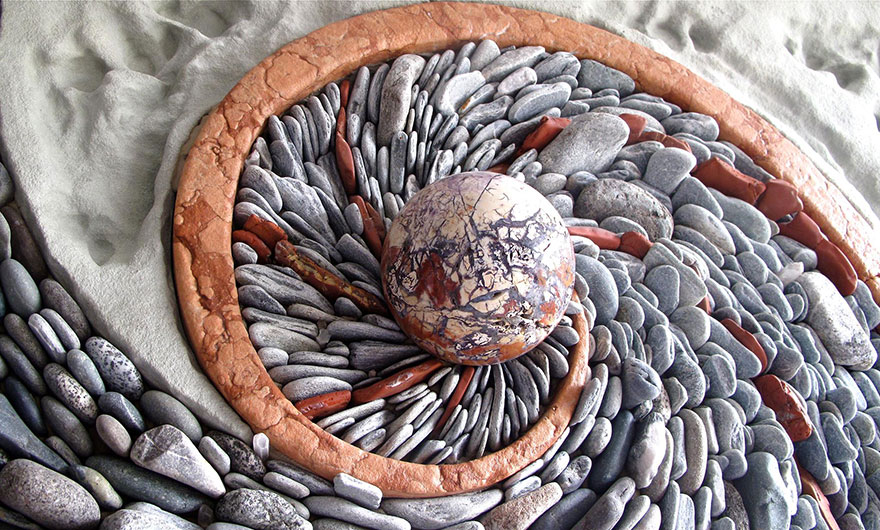
The Mellon Advancing Intercultural Studies Conference May 6-7 will examine issues and benefits of diversity.
RIVERSIDE, Calif. – A two-year research project exploring issues and benefits of diversity at the University of California, Riverside and in Southern California will conclude with a conference May 6-7 in downtown Riverside that is open to the public.
The Mellon Advancing Intercultural Studies Conference, sponsored by the UCR Center for Ideas and Society, will present research conducted by nearly 50 UCR faculty and graduate and undergraduate students. The public is invited to join the discussion, which will focus on these topics: “Beyond Diversity: Are We There Yet?”; “The Public Practice of Immigrant and Minority Religions in Southern California”; “Civic and Political Engagement”; and “Migration, Displacement & Movement.”
Activities will begin at 9:30 a.m. on Friday, May, 6, and conclude at 4:30 p.m. on Saturday, May 7. The event will be held in the Barbara and Art Culver Center of the Arts, located in UCR ARTSblock, 3824 Main St., Riverside. The conference is free and open to the public. Attendees may RSVP by emailing cisevents@ucr.edu with the subject line AIS Conference.
The research project, Advancing Intercultural Studies, was funded by a $208,000 grant from the Andrew W. Mellon Foundation to support a two-year series of seminars that examined changing perceptions of ethnic, cultural and cosmopolitan identities, the practices of immigrant religions, and developments in civic and political engagement at UCR and in Southern California.
“This culminating conference of the Advancing Intercultural Studies project will, we hope, be of interest to educators, religious and political leaders, and all members of the Southern California community,” said Georgia Warnke, director of the Center for Ideas and Society and professor of political science. “Questions we will be addressing include: Does diversity in education mean simply accessibility or a rethinking of traditional forms of knowledge? How far does religious tolerance extend? What new forms is civic participation taking? How do immigration and migration feel to immigrants or migrants themselves? We hope both to engage and learn from the public in considering these issues.”
Keynote speakers will be John L. Jackson Jr., a filmmaker and dean of the School of Social Policy and Practice at the University of Pennsylvania, and Gaye Theresa Johnson, who teaches at UCLA and is a housing and civil rights advocate for residents of L.A.’s Skid Row.
Jackson will discuss “Dissertations, Digitality, and Diversity: What Multi-Modal Scholarship Means for Academic Inclusivity” at 4 p.m. on May 6. He is the Richard Perry University Professor at Penn, and has produced a feature film, documentaries and short films that have screened at film festivals around the world. His most recent film, co-directed with Deborah A. Thomas in 2012, is “Bad Friday: Rastafari After Coral Gardens,” which examines the history of violence in Jamaica through the eyes of its Rastafarian community. Among his books are “Thin Description: Ethnography and the African Hebrew Israelites of Jerusalem” (2013); “Racial Paranoia: The Unintended Consequences of Political Correctness” (2008); and “Real Black: Adventures in Racial Sincerity” (2005). His work also explores how film and other non-traditional or multi-modal formats can be most effectively used in scholarly research projects.
Johnson will discuss “From Shared Pasts to Radical Futures: The Perils and the Promise of Coalitional Politics” at 11 a.m. on May 7. She is associate professor of African American Studies and Chicana/o Studies at UCLA, and is an activist with the Los Angeles Community Action Network , which presented her with its Freedom Now Award in 2013. She is the board president of the Central Coast Alliance United for a Sustainable Economy, and an advisory board member for the Goldin Institute and the Rosenberg Fund for Children. Johnson is the author of “Spaces of Conflict, Sounds of Solidarity: Music, Race, and Spatial Entitlement in Los Angeles” (2013). She has two forthcoming books, “The Futures of Black Radicalism” (co-edited with Alex Lubin) and “Let’s Get Free: Musicians on Activism in the 21st Century.” She is also working on a book titled “These Walls Will Fall: Protest at the Intersection of Immigrant Detention and Mass Incarceration.”
Show and Prove: Tensions, Contradictions, and Possibilities of Hip Hop Studies
Conference coming to UC Riverside, set for April 8-10
By Mojgan Sherkat on March 22, 2016

Dance performance during the 2012 Show and Prove Hip Hop conference. Photo Courtesy: Amanda ‘Lafotographeuse’ Adams-Louis
RIVERSIDE, Calif. (www.ucr.edu) – The University of California, Riverside is hosting the Show and Prove Hip Hop Studies conference, scheduled for Friday, April 8 to Sunday, April 10. The conference is free and open to the public, but registration is required. Complimentary parking permits are available at the kiosk near the University Avenue entrance to campus. The themes for this year’s conference are “spirit” and “performance;” and are focused on cultivating the necessary and critical dialogues for the development of hip hop studies.
This is the first year Imani Kai Johnson, assistant professor of critical dance studies at UC Riverside, has coordinated the conference at UCR. She has organized the conference twice, in 2012 and 2014, during her time at New York University.
“As universities have adopted classes about hip hop, and an increasing amount of scholarship gets published, this series was created for those with a vested interest in the culture – including artists and practitioners, students, scholars, and community activists – to interrogate, complicate, and critically negotiate what it means to bring Hip Hop into the academy,” said Johnson.

Show and Prove Hip Hop conference, 2012. Photo Courtesy: Amanda ‘Lafotographeuse’ Adams-Louis
Founded by Johnson, the conference is co-sponsored by the UCR dance department, Center for Ideas and Society, African Student Programs, UC Humanities Research Institute, and UCR’s history, gender and sexuality studies, ethnic studies and theater, film & digital production departments.
Conference events will be held at the ARTS and INTS buildings on the UCR campus, with evening performances at the Barbara and Art Culver Center of the Arts at 3834 Main Street, Riverside, CA.
For the full schedule, and detailed information, please go to the Show and Prove conference website.
“Sea Seed”: An Entertaining Education
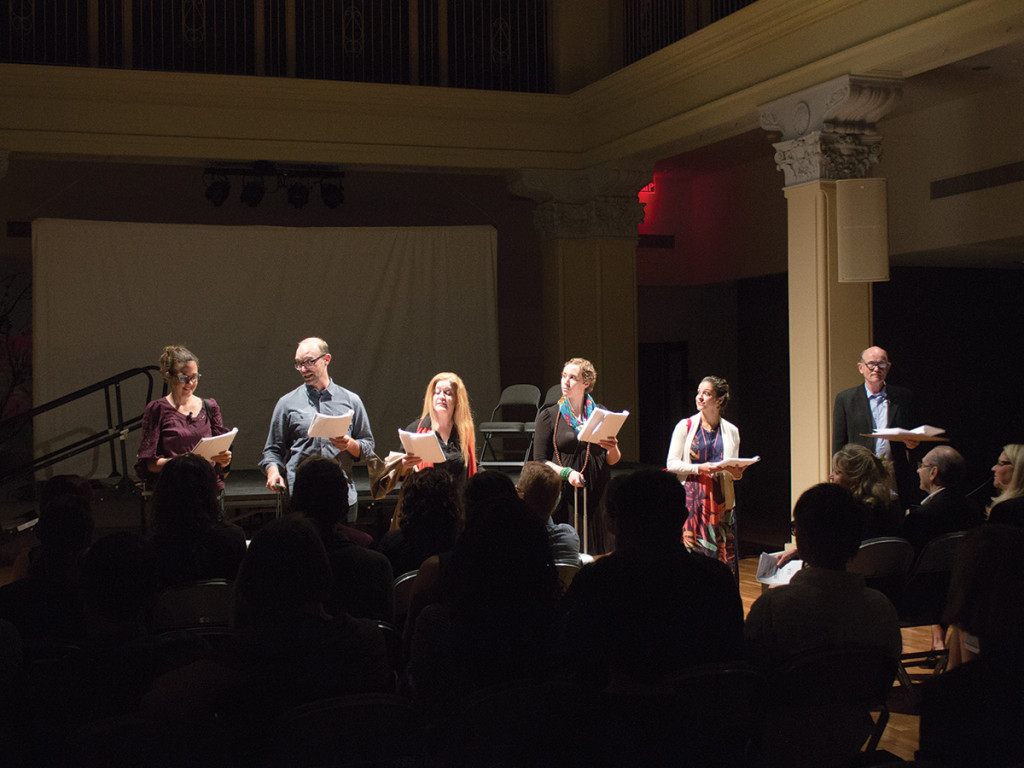
Highlander/ Jeffrey Chang
There are very few places that get as dark and empty as downtown Riverside on a Tuesday night at 8 p.m. When I arrived at the Culver Center to watch “Sea Seed,” a staged reading composed by the Sons of Semele Ensemble, a small trickle of visitors to the evening’s play occasionally went from the darkness outside to the white brightness of the Culver Center.
The third reading in a series, this was the final reading of the play — which has been edited after each audience reading to make it more relatable “based on audience feedback, the company fine-tuned and polished the text.” This reading was the culmination of a two-year creative process on behalf of Dr. Erith Jaffe-Berg and the Sons of Semele Ensemble. Jaffe-Berg, who is the head of Theatre, Film and Digital Production at UCR, was inspired by the themes set forth by fellow faculty member Dr. Susan Ossman, in her book “Moving Matters: Paths of Serial Migration.” All the characters — as well as symbols and ideas from the play — embody what it is like to be a serial migrant (a term coined by Ossman to define a person who “travels between three or more countries, living in different languages and experiencing repeated patterns of movement and migration”).
When the lights faded and the cast stood in a line and started to remark on the strange things people bring to the airport: a change of underwear in the carry-on, an emergency skirt, I started immediately to connect those things with my own experiences of traveling. However I feel as if someone who has little experience with international travel may lack a certain connection with the play. It is majorly concerned with a sort of cosmopolitan migratory experience which most university students see little of.
It was a staged reading of the play, which means that the cast carried their scripts around and had a strange lack of props, which was only obvious to me at two points: when the cast members used a Kleenex box to symbolize a piece of art, and when they were allegedly proposing a toast with invisible glasses. Most of the time, the use of folding plastic chairs was not much of a distraction, as sooner or later I found myself more immersed in what the characters were saying and doing than the esoteric props.
UC Riverside Presents “Sea Seed”
The original play will be presented at the Barbara and Art Culver Center of the Arts on Feb. 16
By Mojgan Sherkat on February 12, 2016
RIVERSIDE, Calif. (www.ucr.edu) – Erith Jaffe-Berg, chair of the theatre, film and digital production department, will present an original play called “Sea Seed” on Feb. 16 at the Barbara and Art Culver Center of the Arts. The play was developed by members of the theater group the Son of Semele Ensemble and Jaffe-Berg, and inspired by Moving Matters Traveling Workshop (MMTW), an arts collective that has developed exhibitions, performances and participatory artworks.
Sponsored by the Center of Ideas and Society, the event is free and open to the public. The play begins at 8 p.m. at 3834 Main St., Riverside.
“‘Sea Seed’ explores the topic of repeated migration, or serial migration, and the experiences of those who have lived in several countries throughout their lives,” explained Jaffe-Berg.
The concept of serial migration was developed by Susan Ossman, an anthropology professor at UC Riverside, in her book, “Moving Matters: Paths of Serial Migration.” Ossman describes a serial migrant as one who travels between three or more countries, living in different languages and experiencing repeated patterns of movement and migration. The concept and book also sparked the creation of MMTW in Riverside in 2013.
Curation of Migration
Anthropology News article by on the Moving Matters Traveling Workshop.
Oxford Professor of Poetry, Simon Armitage, gives reading on campus
By Robert Lees on
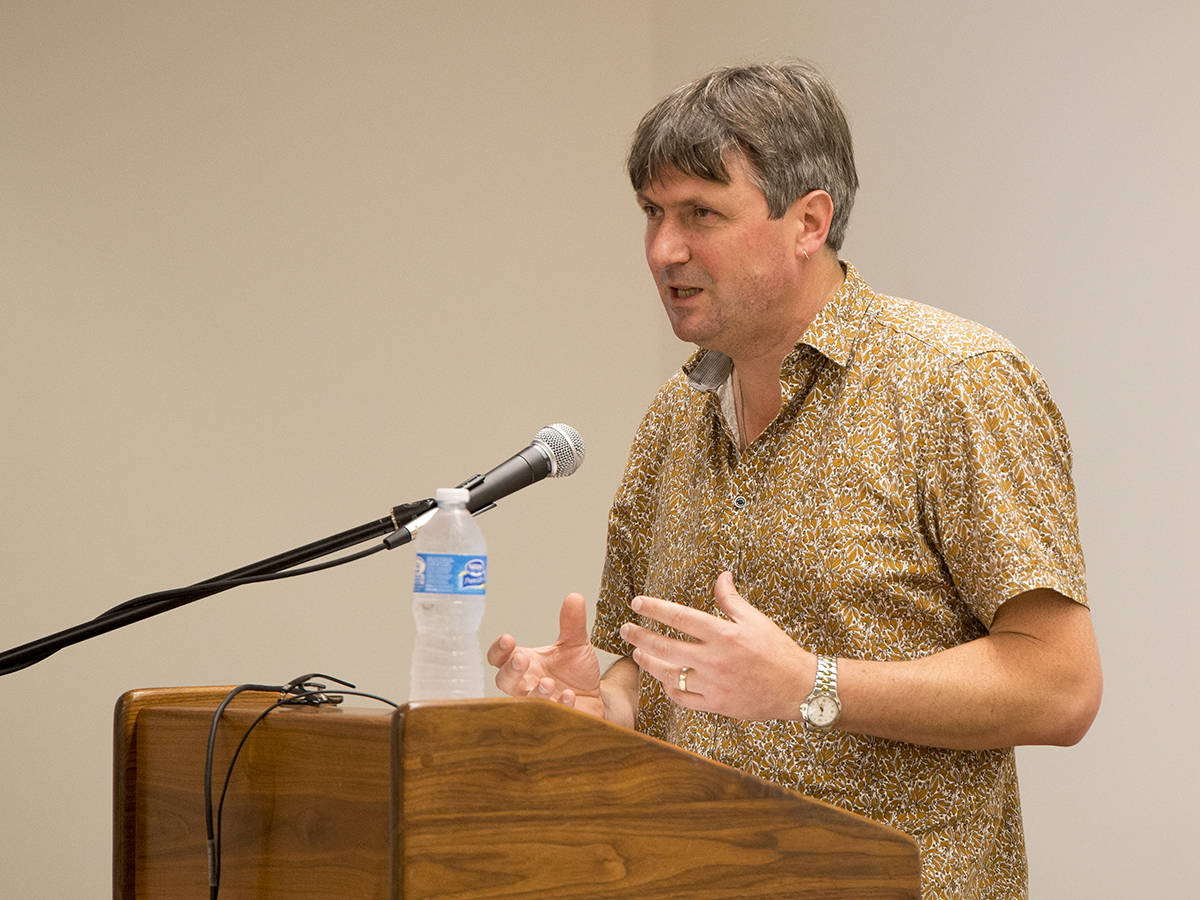
One of England’s leading poets and current professor of poetry at Oxford Simon Armitage gave a reading followed by a book signing last Wednesday at INTS 1113. He read about 10 poems that spanned his career, from his early work in “Seeing Stars” to his translation of “Sir Gawain and the Green Knight.” The crowd was decent sized, with about 40 people which included students as well as professors, many of whom were familiar with Armitage’s wide body of work. Overall, the entire event was intimate and inviting, with Armitage being very open to questions.
The first poem he read was titled “Thank You for Waiting” which was a wonderfully witty and sly poem, recited as if the narrator was a flight attendant. As Armitage began his reading, he invited us into his comic world. In between poems, Armitage would offer some background information on the poems, the frame of mind that he was in when he wrote them as well as various opinions he holds when it comes to poetry or politics. This background information really helped place his poems in context, and made his reading accessible for people who are very familiar with his work, as well as those who are not.
These tangents were always incredibly insightful, and made the reading more of a master class in poetry by one of its best practitioners, than a performance. One insight I found very interesting was when he introduced his third poem, “An Accommodation” by comparing it to song lyrics. He began, “Some people here consider song lyrics to be poetry, and talk about Leonard Cohen or Bob Dylan as poets, but I’ve never thought so. Song lyrics aren’t poetry because even though they have the same fabric of language, and texture, poetry comes with its own little score that song lyrics don’t have because they always come with music.” I found this interesting, because many people, myself included, usually do not distinguish between the aesthetic pleasures that song lyrics give, as opposed to poems. His tangent ended up changing my own opinion on the subject.
The poems ranged from funny, to impressionistic, to celebratory. However, the last poem, titled “Columbine” was the most memorable. A moving pean to the victims of the Columbine shooting, Armitage’s poem narrates the event in the style of a news report. However, he replaces every mention of guns and bullets with the word “flowers.” The poetic inversion really highlighted the tragedy of the Columbine Massacre.
Huntington Library and UC Riverside
By Larry Gordon, LA Times
In an effort to promote scholarship in the humanities, the Huntington Library will subsidize the hiring of two professors at UC Riverside and host them as researchers for two years.
Plans being announced Wednesday describe the program as a way to help support the study of humanities at a time when some departments are facing cutbacks as more attention is paid to science and technology on college campuses.
Marco Angella receives Post-Doctoral Fellowship
Our 2014-15 Visiting Fellow, Marco Angella, has received a two-year Post-Doctoral Fellowship from the University of Pretoria for 2015-2017.
Humanists@Work
Congratulations to UCR’s Jose Medrano, Hispanic Studies, for being one of six students selected for the Humanists@Work graduate student advisory committee!
Humanists@Work is a UC-wide initiative geared towards UC Humanities and humanistic Social Science MAs and PhDs interested in careers outside/alongside the academy. Learn more
